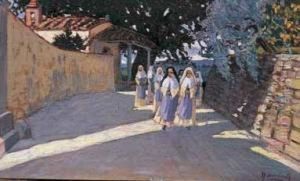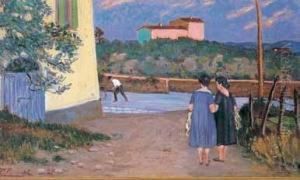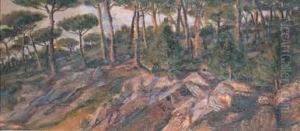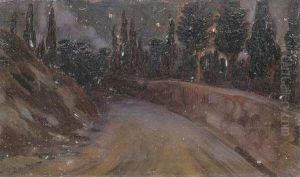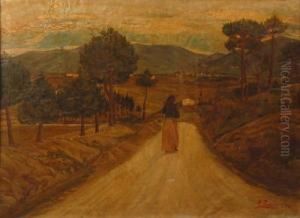Ferdinando Paolieri Paintings
Ferdinando Paolieri was an Italian writer, art critic, and intellectual, born in Florence in 1889. His work and influence span a critical period in Italian history, encompassing both World Wars, the rise of Fascism, and the subsequent establishment of the Italian Republic. Paolieri's contributions to Italian cultural life were multifaceted; he was not only a prolific writer but also an influential art critic, deeply involved in the intellectual debates and cultural developments of his time.
Paolieri's early life in Florence, a city with a rich artistic and cultural heritage, profoundly impacted his career and intellectual trajectory. He was part of the vibrant Florentine cultural scene, which allowed him to engage with prominent artists, writers, and thinkers of the day. His writings, which include essays, art criticism, and novels, reflect a deep engagement with the aesthetic and philosophical concerns of his era. Paolieri was particularly interested in the role of tradition and modernity in art, a theme that recurs throughout his work.
Throughout his career, Ferdinando Paolieri was recognized for his articulate and insightful critiques of contemporary art movements. He was adept at navigating the complex landscape of Italian art, which was marked by rapid changes and a tension between the classical heritage of Italy and emerging modernist trends. Paolieri's contributions to art criticism were not limited to his written work; he also played a significant role in art education, lecturing at institutions and engaging in public discourse about the value and direction of Italian art.
Despite the tumultuous political climate of Italy during his lifetime, Paolieri managed to maintain a focus on the cultural and artistic dimensions of the country's identity. After World War II, he contributed to the intellectual rebuilding of Italy, advocating for a renewed appreciation of its artistic heritage while also encouraging openness to new artistic expressions. His writings from this period reflect a belief in the power of art to heal and rebuild a fractured nation.
Ferdinando Paolieri passed away in 1973, leaving behind a legacy as a thoughtful critic and passionate advocate for Italian art and culture. His work continues to be studied by those interested in the evolution of Italian art criticism and the complex interplay of culture, politics, and identity in 20th-century Italy.
